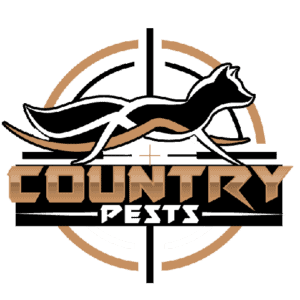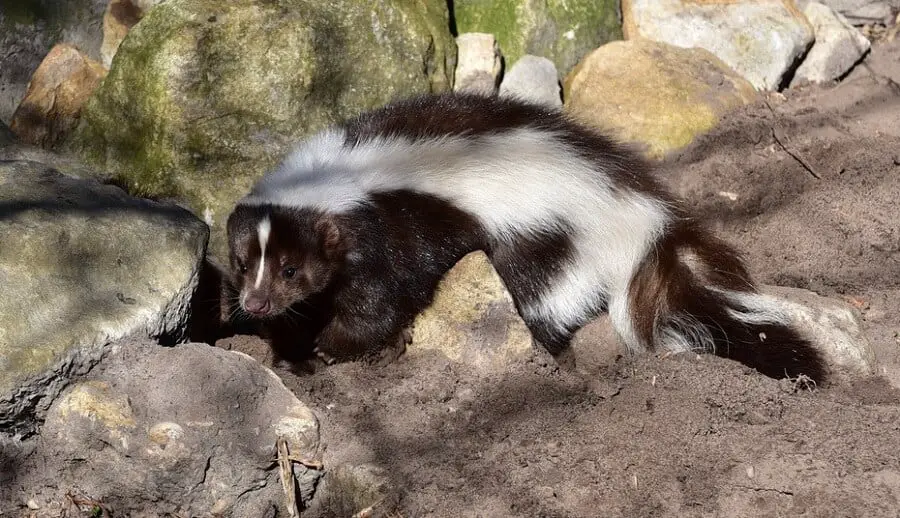Most people hate the smell of a skunk and want to keep them away. I might be the only person who doesn’t mind the smell of skunk. It reminds me of sleeping outside at my grandparent’s house and smelling a nearby skunk. That doesn’t mean I want to be sprayed, however.
There are several methods that you can use to repel skunks or to get them to leave your property safely. This article will cover steps to take and address specific situations such as skunks under your deck, in your garage, and near your shed.
10 Steps To Keep Skunks Away
- Clean Up Trash And Secure Cans
- Get Rid Of Fallen Fruit, Branches and Leaves
- Put Away Pet Food And Bird Feeders
- Clean Up Animal Bedding
- Use Motion Detector LIghts
- Use Motion Sprinklers
- Use Fencing To Keep Skunks Out
- Seal Off Tunnels, Holes, and Access Points
- Use Natural Repellents
- Trap The Skunk
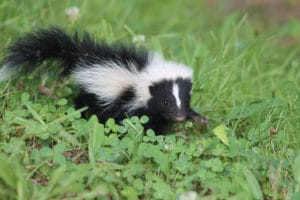
Clean Up Trash And Secure Cans
Skunks are omnivores and will eat most things. Food smell is the greatest attraction that brings skunks to neighborhoods and homes. Get rid of that smell and get rid of the access to food waste.
Use garbage cans. Never let garbage sacks pile up in your yard. They are easy to rip and easy to smell. It will cause more time cleaning up the mess.
Use garbage cans with secure lids. This will help to contain the smell and make the scraps inside less accessible for any animal. Skunks don’t climb well so they aren’t going to get into a tall garbage can, but they can often nudge it over.
Even if they can’t enter it, they have already been attracted to your property.
If it’s possible, store your garbage can securely inside. Even closing it up in the garage is better than leaving it outside. It will contain the smell.
But, make sure that your garage is secure so you don’t end up with a skunk inside!
Get Rid Of Fallen Fruit, Branches and Leaves
Skunks not only eat fruit and leaves but also love the bugs that tend to hide under. They scavenger well. Bugs are one of the preferred diets of skunks. So eliminating those areas with higher concentration of grubs and insects is a great way to stop inviting a skunk over for dinner.
There’s another reason to clean up organic debris.
They will hide under organic debris, branches, and other makeshift coverings. Skunks typically like to use other animal’s dens and holes. They hide under leaves and branches for protection.
Pick up the fallen nuts, berries, and fruit on your lawn. Rake it up consistently.
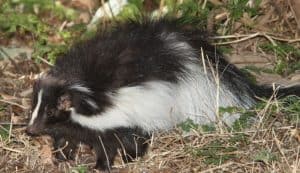
Put Away Pet Food And Bird Feeders
Pet food is another great attraction of skunks. Just like a skunk, your cat or dog also likes to eat both meat and plants. Pet food is formulated for that diet and is an ideal food for wildlife to steal.
Skunks are night animals so putting away the pet food at night will keep it from attracting a skunk.
Use bird feeders that prevent poaching by larger animals. Hang bird feeders up or use special feeders for poultry. This prevents your skunks from getting into an easy meal.
Clean Up Animal Bedding
Skunks are scavengers and are attracted to waste piles and dirty areas to den in. Chicken hay, dog houses, or other animal bedding can attract them. Rotate hay, clean or spray down dog houses, and deodorize as much as possible. Sprinkle baking soda over the bedding to neutralize the smell.
Use Motion Detector Lights
Skunks like to do their hunting at night. In some cases, bright lights can keep skunks away. But, that is only effective if smelly odors and food are already put away and contained. A hungry or determined skunk will put up with lights to get food.
If you have already cleaned up around your property. Adding solar motion lights works as an added barrier. Skunks don’t like the light when they are out hunting. They don’t have a lot of defense mechanism.
The only real defense they have is their smell and that won’t keep away a hungry predator. That’s why they prefer the dark where they can blend in a little better.
Use Motion Sprinklers
Motion sprinklers are another way to create a barrier between your yard and a skunk. It also works best when the skunk attractions are cleaned up and gone.
A motion sprinkler detects movement and turns on blasting the skunk, or other animals. It works well if the skunk isn’t too sure that you have food for it nearby.
Sprinklers work best to keep skunks away. If you have a determined skunk who has already feasted in your yard, sprinklers won’t do as much good.
Use Fencing To Keep Skunks Out
Skunk-proof fencing doesn’t have to be tall or complicated. It needs a few specifics to be effective, but can be made out of cheap materials. But, if you are trying to keep out more predators than just skunks, you may want to build a fence that will accomplish both purposes.
Skunk fences need to only be 3 or 4 feet high. Skunks don’t climb well if you can really call it climbing at all. They can stand up on their hind legs, but can’t do much better than that.
The fence needs to be buried 1 foot deep. Skunks, as well as many other animals, are very good diggers. They will dig to get under a fence if they smell something or can see through slots in the fence.
But, usually skunks don’t dig, they use other animals burrows. A buried fence will keep all sorts of animals from digging under the fence.
- 3-4 feet high
- Bury the fence 12 inches deep
Seal Off Tunnels, Holes, and Access Points
Skunks look a lot bigger and fatter than they actually are. Their fur puffs out creating the illusion of a larger animal. In reality, skunks can fit through most holes that are about 4” wide or larger.
Holes need to be less than 4” wide. Seal all holes in your fencing with hardware cloth.
Bury and cover animal holes around your yard and along your fence line.
Add an apron around your fence if your fence isn’t on your property line. An apron comes out 2-3 feet and is usually made of wire fencing that can be placed along the ground around the fenceline. It attaches to the fence and keeps animals from burrowing down.
Check your deck, trees, bushes, and other areas where skunks can bed down. Seal or cover all holes. Trim bushes to eliminate hiding spots and cover holes with gravel.
Check barns, foundations, decks, poultry coops, and sheds for holes or other places a skunk would find inviting. Cover and repair walls with plywood or fencing.
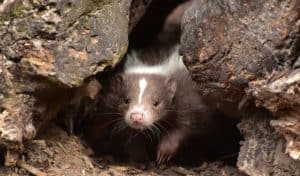
Use Natural Repellents
Orange peels are pungent and repel many wild animals. Skunks have been known to avoid an area with fresh orange peels.
Hot pepper spray can also help keep them away. Sprinkle pepper spice around the area so they smell it as they come along sniffing the ground.
Dog urine and wolf urine have also been known to keep skunks away because both animals are predators of skunks. Female dog urine can attract other dogs to your property so be aware.
Trap The Skunk
When trapping a skunk, first make sure that it is legal in your area to do so. Some states in the USA have laws prohibiting the trapping of skunks unless it is by a licensed professional.
Add the bait in the trap. Skunks like bacon, sardines, chicken, or other meat-based food. Wet dog or cat food will also bait skunks well.
Place the trap at the outside of a skunk burrow, hole or bedding area. It can be placed near the entry point to a deck, foundation, or shed. Skunks usually use the same entry points.
Set the trap.
Camouflage the trap. Skunks are intelligent enough to avoid a trap. Cover it with branches and leaves.
If the skunk prints appear to go into the den and it may be sleeping in your shed, deck or foundation, place the trap against the exit point. Check it the next morning for a skunk.
When you capture a skunk, be sure to use a heavy towel or burlap bag to cover the trap. This will help protect you from getting sprayed.
How To Keep Skunks Away From The Garden
Skunks love plants and bugs alike. They will eat low fruits and other vegetables that are within easy reach. This makes them a dangerous visitor to the garden because they can destroy young plants and keep you from enjoying your harvest.
The most effective way to keep skunks away from the garden: Put a sturdy fence around the garden, burying it at least 12 inches. Keep produce picked as soon as its right. Cover or fill other animal burrows and holes. Use motion activated sprinklers to invite skunks to leave. Keep compost rotated so it doesn’t develop holes or animal tunnels. Plant squash plants along the outside of your garden since skunks won’t walk on the prickly leaves. Use smell repellents such as orange peels or fox urine to keep skunks away. Remove all water sources and standing water containers that collect bugs and provide water for skunks.
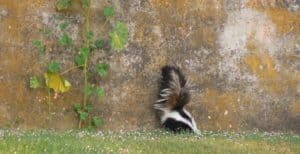
How To Keep Skunks From The Lawn And Property
One of the signs of a skunk in your lawn is a lot of holes in the lawn. They stick their nose into the grass looking for grubs. Skunks are usually attracted to the area because of scent or food. Skunks eat leaves, lizards, frogs, rodents, and insects. They love worms, fallen fruit, eggs, nuts, and pet food.
The Best Way To Keep Skunks Off Your Lawn: Keep your lawn cleaned up and free of clutter or debris. Clean up woodpiles and get rid of tree branches and leaf piles. Keep your grass raked and free of any fallen fruit or nuts off of trees. Fill animal burrows and holes. Repair holes in your fence, under your deck, or in your foundation. Use a motion activated sprinkler or lights to alarm the skunk when entering your property. Some people have amazing luck using orange peels spread around the yard. Replace every 3-5 days.
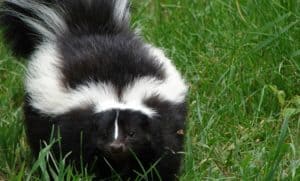
How To Keep Skunks Away From Chickens
Skunks are in the weasel family and can kill or harm a chicken even though they won’t eat one. They love chicken eggs and may fight a hen to get access to the eggs.
Here are 7 things to protect your chickens from a skunk.
- Install a covered chicken run. Gaps in fencing should be less than 4” wide. Covering will help keep out other predators but isn’t required for skunks.
- Fencing at least 3 feet tall and buried 1 foot deep. This prevents skunks from burrowing down. Slope the bottom of the fence outward to discourage burrowing.
- Install a coop apron. Coop aprons are just fencing that lays on the ground going out from the coop. It has small holes so it doesn’t allow for digging. The fencing attaches to the coop fencing.
- Lock up chicken feed. Use bucket feeders or automatic chicken feeders to keep the chicken food away from rodents. Rodents can attract skunks as can chicken food.
- Put away trash cans. Lock the lids so they can’t be pushed over and spilled. Put trash away from the coop or lock in the garage.
- Remove debris piles, woodpiles, and branches. Skunks love to scavenge for a place to nest. This includes trash piles, brush or other covered areas.
- Replace Bedding and Hay. Keep the chicken bedding clean and odor free, as much as possible. Replace hay. Sprinkle baking soda in the hay to deodorize it.
- Collect Eggs Regularly. Skunks will be attracted to the smell of eggs. Collect them regularly to avoid attracting skunks.
- Trap skunks. If you still have a persistent skunk problem in your chicken coop, you may need to trap the skunk and move it to another area. Make sure you have permission from the property owner and that trapping skunks are legal in your area.
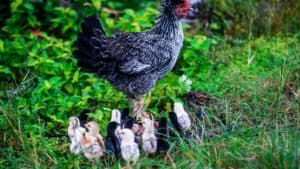
How To Keep Skunks From The Trash And Garbage
Don’t let skunks get into the garbage. Secure all trash bags in trash cans. Secure the lid tightly so that it can’t get pushed off by an animal. Put trash cans near walls so they can’t be pushed over. Place cans in the garage or inside where the smell won’t attract skunks. Lock the garage. Pull in all dog and cat food at night. Keep other trash and debris piles cleaned up around the yard.
How To Keep Skunks From Cat Or Dog Food
Cat and dog food are a huge attraction for skunks. The only way to keep skunks away is to put away your cat food at night. Skunks eat meat. Meat-based ingredients are major ingredients in cat and dog food. Skunks scavenger for food and will eat what is left out. Lock animal doors at night so skunks can’t enter into the house or garage to reach the food. Sweep up any spilled food from the yard and driveway.
How To Keep Skunks From Bird Feeders
Skunks don’t climb well and bird feeders that are hung high will be inaccessible for skunks to get. Spilled bird food should be swept or cleaned up to avoid attracting the insects and rodents. These and the birdseed will both attract skunks to an area.
If you have a low-hanging bird feeder, consider a squirrel-free bird feeder that prevents larger animals from accessing the birdseed. Use a birdseed catcher to catch the fallen birdseed. Use no-waste bird seed that is made of 100% birdseed that birds like. This prevents them from sorting through the birdseed and throwing the rest on the ground.
How To Get Rid Of Skunks Underneath House
One of the scariest situations involving skunks is when they get into the foundation or under a house. This poses a great risk because the skunks could spray and the smell permeate the entire house. It lasts up to 6 months!
Skunks look for a place to mate in the early spring. Male skunks follow the females in and are likely to be refused. When this happens, the male skunk sprays a defensive spray at her. This is bad news for your house!
Kits are born in April and May and more skunks mean an even greater chance of a spray. Kits are startled easier and more likely to spray.
Get Rid Of Skunks Under The House: Make sure that you know if there are just adult skunks or if there are also kits. If the kits are not old enough to leave the den, then extra precautions must be taken. Adults can be trapped and moved, but young kits will need to be manually moved. In this case, hire a professional.
Locate all the entrances to the house. Skunks can enter anything four inches or wider. Anything close to that size should be noted. Locate the entrances used by the skunks. They will generally use the same paths.
Install one-way doors that allow the skunks out, but do not allow them back in. This approach can be used if kits leave the den.
Set traps near the entrances. Camouflage them. Release skunks on another side of the property.
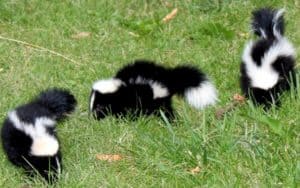
How To Get Rid Of Skunks In The Neighborhood
Smelling skunks in your neighborhood can make anyone nervous. However, skunks in the area usually aren’t a problem. They help to keep the mice and insect populations in control. Getting rid of skunks is a neighborhood effort. Trash, debris, piles of stuff must all be cleaned up. This includes alleyways, public land, and stretches of land among the roads.
All the neighbors should keep pet food put away at night and trash cans locked up. If there are places for the skunks to hide under, burrow into or food to eat, the skunks will migrate there. That’s why it’s important to be thorough.
How To Get Rid Of Skunks In My Barn
Barns are a very attractive place for skunks because they usually smell, have many places to hide, and offer animal food.
The best way to get rid of a skunk in your barn:
- Thoroughly clean and organizing your equipment.
- Change animal bedding and hay. Sprinkle baking soda in it to eliminate odors
- Organize equipment above the ground. Hang rakes and shovels instead of piling them against the wall
- Move and rotate large equipment so that it doesn’t offer protection in the same places
- Sweep and clean stalls
- Keep barn closed at night
- Cover cracks, holes, and gaps with hardware cloth
- Put animal feed away at night or lock it up
- Take trash out of the barn
- Use organic scent repellents such as oranges, peppers, and dog urine to keep skunks away
How To Get Rid Of Skunks In My Garage
Skunks can be attracted to the garage from trash, animal food, and other smells. They love to bed down in junk, debris, and even old cars. This makes the garage an ideal place for skunks to hide. Skunks are nocturnal and usually leave their den at night in search of food.
Get A Skunk Out Of Your Garage
- Put away pet food
- Locate the entrances to the garage and install a one-way door
- Add bait outside of the garage to attract the skunks outside. Skunks like eggs, fish, meat, chicken, and pet food.
- Trap skunks if needed
- Lock and seal all holes to the garage so skunks can’t enter again
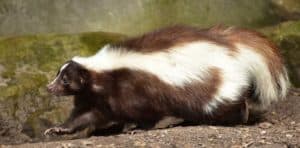
How To Get Rid Of Skunks In The Shed
Sheds are usually darker, shorter, and harder to see into. They usually offer many things for skunks to hide under. Sheds can wear out and have holes in the walls or under the shed. Those are places that skunks love to hide. To get rid of a skunk, follow these steps:
- Use a bright light to inspect the shed for skunks
- Seal holes to the inside of the shed. Cover with hardware cloth or plywood
- Fill burrows
- Clean up bushes, leaves, and trash around the shed
- Add scents to repel the skunks. Cayenne pepper, orange peels, or dog urine is often effective
How To Get A Skunk Out From Under The Deck
Decks are easier places for skunks to hide under. They usually offer many places that skunks can enter into. Getting rid of a skunk under the deck involves five important steps.
- Locate all the entrances.
- Seal all but one of the entrances. Seal the connection between the deck skirt and the rest of the house or other structures
- Install a one-way door that allows skunks out, but not back in
- Fill holes and burrows
- Use bait to attract the skunk out from your deck
How To Get Rid Of Skunk Smell: 6 Natural Home Remedies
Skunk spray is very pungent. It can be smelled up to one mile away. When a skunk sprays you, your pet, or part of your house, it will smell for a while. There are several natural methods to get rid of skunk smell. These home remedies are effective and affordable.
How to get rid of skunk smell: Six methods for getting rid of skunk smell are generally effective. While they may not get rid of 100% of the smell with one use, they will substantially diminish the smell of skunk.
- One part apple cider vinegar to two parts water. Cover well. Soak the area for at least 5 minutes. Rinse
- One cup vanilla extract per one gallon of water. Soak for at least 10 minutes.
- One quart hydrogen peroxide, one tsp Dawn dishwashing soap, and ¼ cup baking soda mixed. Soak for 5-10 minutes. Rinse
- Tomato soup: The effectiveness depends on the acidity of the tomatoes. Home bottled tomato soup tends to work better than store purchased tomato soup.
- Sunlight helps on fabric and diluted ammonia works well on wood surfaces
- Boil vinegar to rid your house of skunk smell. Place open containers around the affected rooms.
Home Remedy To Keep Skunks Away
Pepper water, cayenne pepper flakes, and dog urine are all home remedies that are rumored to keep skunks away. Another remedy is to use citrus peels around the area.
Make pepper water by boiling an onion, several jalapenos, 1 TBSP cayenne pepper in 2 quarts of water. Boil it for 20 minutes. Strain and spray. It should be reapplied every 3-5 days.
Do Mothballs Keep Skunks Away
Moth Balls will not keep skunks away. Skunks require as many mothballs as humans to be effective. This is dangerous for people and pets in an area. If using mothballs outside, then it will be ineffective because the wind and breeze will carry away the scent.
Although mothballs are the magical cure for keeping away nearly every animal, in reality, they usually don’t work and often cause harm to the environment and to animals alike. They contain poison that contaminates dirt and air. They cause danger for children, pets and other animals.
How To Scare Skunks Away Without Getting Sprayed
Don’t try to scare a skunk away. When skunks startle, they are likely to spray. Your best bet is to pull your dog or cat inside so that they are less likely to scare the skunk. Observe the skunk and see what the attraction to the area is. This will provide you with a way to eliminate that attraction. If you are near the skunk, move slowly away and avoid sudden movements. Be quiet and don’t yell or startle. Skunks might leave an area with citrus peels, cayenne pepper, or ammonia in the area.
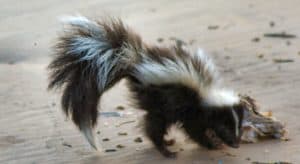
Why Do Skunks Stink All The Time
Skunk perfume can smell for up to 6 months. That means that any residue spray that catches on a skunk’s fur continues to emit an odor even when the skunk hasn’t recently sprayed. Skunks spray for defense, in mating, and to mark an area. This means that a skunk usually has some smell on it. Skunks take as long as a 1 ½ weeks to replenish their supply. They can spray as much as 10 feet away.
Why Do Skunks Spray At Night
Skunks are nocturnal. That means that most of the time they are active at night. The night is when a skunk faces more dangers and is more likely to spray. The night also usually means mating time, which is another time that skunks spray. During the day, skunks are usually asleep and won’t spray unless they are awakened or startled. When skunks come out of their dens, their natural odor follows them.
[post-carousel id=”364″]
